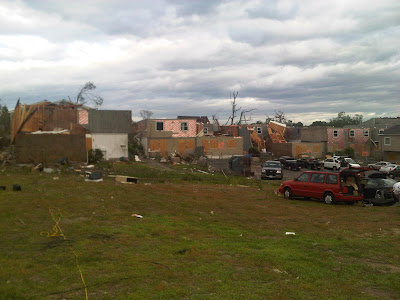Sam Kille, our region’s Senior Director of Marketing and Public Relations, discusses his deployment to New England as part of the American Red Cross' Advanced Public Affairs Team, in response to a series of tornadoes that hit several Massachusetts’ communities on the evening of June 1.
Twenty-four hours without sleep tends to make me a bit cranky and feeling less than talkative, especially when a cup of coffee is nowhere in sight. Yet normal goes out the window when standing in the middle of a neighborhood literally crushed by the fist of Mother Nature.
Called “Six Corners” by its residents, this neighborhood’s damage was the backdrop of many reporters’ coverage of the tornadoes that hit not only Springfield, but several Massachusetts’ communities on the evening of June 1. I had arrived there during the middle of the night, with my fellow Long Islander Craig Cooper, to work with the media to let the public know how the American Red Cross was helping the victims.
While waiting for opportunities to go on camera, we received word of a press conference with the governor, so Craig headed downtown and left me behind to handle interviews there. As you might expect, Craig was held up for a while and I was pretty much stranded after making my rounds. So, I did the only thing I could do—listened to the survivors.
As I spoke with residents, it became very clear that they weren’t used to weather events like this in New England—blizzards yes, but not tornadoes. This of course reinforced my “Red Cross brainwashing” that preparedness, far too often, is an “I’ll do it tomorrow” concept—and we don’t always get tomorrows.
One young mother described how she watched the twister come across an open field, barreling toward her townhome-style apartment complex. She grabbed her son and rushed into a hallway, hoping and praying that they would live. Amazingly, other than her windows, her apartment received no other damage. Still, due to the dangers in the neighborhood, she would be seeking shelter from the Red Cross. So, I let her know where our shelter was.
Neighbors, like Hector, weren’t as fortunate. His family’s home, like most of the complex, was completely destroyed. Yet his spirit resonated with me and I must’ve spent a good 20 minutes listening to his life story.
He told me of a motorcycle accident a decade ago that left him in a coma for two weeks—during which, he missed the birth of a child. It was a second chance at a life that had been filled with bad choices and legal woes. From that, he has changed his life, becoming a role model for those who might otherwise turn to gangs or drugs.
And as he spoke of the need for the community to come together and be “reborn” through this disaster, I could only hope that he succeeds and my own determination to help was strengthened.
I heard a lot of great stories of hope and determination that morning. One woman asked me how she could organize a fund drive, more worried about her neighbors than herself. Some tales were truly astonishing like the gentleman who took me to a building and said, “See that? It’s my second floor.” Then he pointed to another building and said, “It was over there.” It was as if Mother Nature had played a game of “musical rooftops” there.
I’m still shaking my head at the fact that there were not more fatalities in Massachusetts. Over a 48-hour period, I would visit many communities including West Springfield, Westfield and Monson. Each had more than its fair share of devastation. Homes, businesses, and places of worship destroyed—many places look more like a warzone. Hundreds have been staying in Red Cross shelters. Many are being served food via Red Cross vehicles driving into affected areas.
And while I was eventually able to get that much cherished cup of coffee, what really drove me—like so many Red Cross workers on the ground—was the knowledge that even if these survivors had somewhere to stay other than our shelters; or had the means to purchase a hot meal on their own; sometimes, hope lies in knowing that someone is there to listen to you—and the American Red Cross does just that.



No comments:
Post a Comment
Note: Only a member of this blog may post a comment.